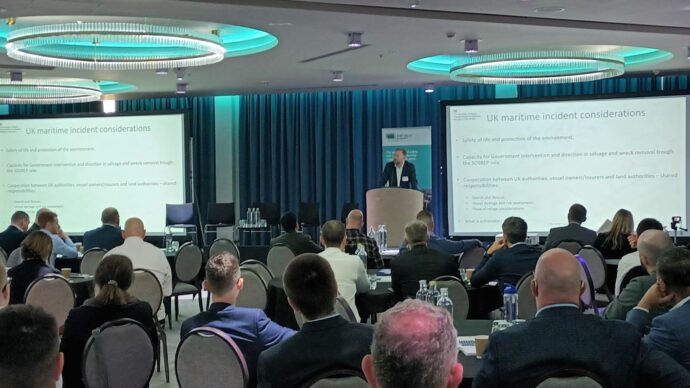NEWS
Ship fires, response options and places of refuge
Campaigns |Published: Oct 25, 2024

Stephan Hennig, the Secretary of State’s Representative for Maritime Salvage and Intervention, addressed the Electric Vehicle maritime safety conference, held in London on the 17 October 2024, on the complexities of responding to maritime fires, particularly those involving Electric Vehicles (EVs) and lithium-ion batteries. Stephan highlighted the distinction between the source of a fire and what is burning, noting that once a fire has started, the priority shifts to managing the fire itself rather than its cause.
Stephan made the following key points during his speech:
- Safety: The primary concern being ensuring the safety of those on board, nearby vessels, and the surrounding population, particularly in coastal areas.
- Responsibility of ship operators: Unlike land-based emergencies, maritime response is largely the responsibility of the ship’s operators, owners, and insurers, with authorities providing support. The state mainly intervenes in search and rescue operations, environmental protection, and ensuring that ship operators act responsibly.
- Challenges in fire response: When dealing with fires swift and safe intervention is crucial. Stephan highlighted the difficulty in obtaining accurate cargo manifests, making it challenging to assess risks.
- Port considerations: Bringing a ship into port is often the initial reaction, but this decision must be carefully evaluated to avoid endangering the wider population and disrupting port operations.
- Regulatory gaps and slow progress: Stephan stressed the need for updated regulations, as current rules may not keep pace with the increasing size and complexity of vessels. They emphasise the importance of proactive collaboration between industry and government, rather than waiting for incidents to occur.
- Skills gap: A generational gap in maritime expertise poses a challenge, as fewer incidents result in fewer opportunities for newer personnel to gain practical experience.
- Collaboration and learning: Joint exercises and open communication between maritime authorities, fire services, shipping companies, and ports are essential for preparing to respond to complex incidents.
Stephan concluded by stressing the need for continued efforts to address challenges and improve response capabilities, acknowledging that solutions to all issues may not yet exist.
